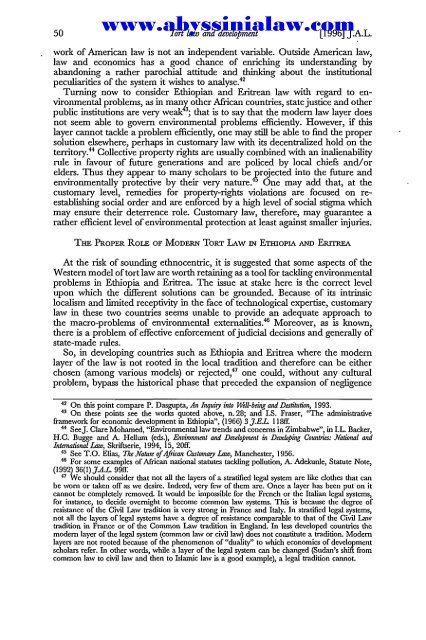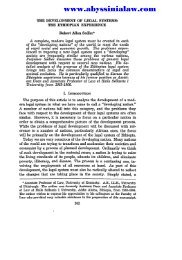Download - Abyssinia Law
Download - Abyssinia Law
Download - Abyssinia Law
You also want an ePaper? Increase the reach of your titles
YUMPU automatically turns print PDFs into web optimized ePapers that Google loves.
www.abyssinialaw.com<br />
Tort law and development<br />
[1996] J.A.L.<br />
work of American law is not an independent variable. Outside American law,<br />
law and economics has a good chance of enriching its understanding by<br />
abandoning a rather parochial attitude and thinking about the institutional<br />
peculiarities of the system it wishes to analyse. 42<br />
Tuming now to consider Ethiopian and Eritrean law with regard to environmental<br />
problems, as in many other African countries, state justice and other<br />
public institutions are very weak 3; that is to say that the modem law layer does<br />
not seem able to govern environmental problems efficiently. However, if this<br />
layer cannot tackle a problem efficiently, one may still be able to find the proper<br />
solution elsewhere, perhaps in customary law with its decentralized hold on the<br />
territory.' Collective property rights are usually combined with an inalienability<br />
rule in favour of future generations and are policed by local chiefs and/or<br />
elders. Thus they appear to many scholars to be projected into the future and<br />
environmentally protective by their very nature. One may add that, at the<br />
customary level, remedies for property-rights violations are focused on reestablishing<br />
social order and are enforced by a high level of social stigma which<br />
may ensure their deterrence role. Customary law, therefore, may guarantee a<br />
rather efficient level of environmental protection at least against smaller injuries.<br />
THE PROPER ROLE OF MODERN TORT LAW IN ETHIoPIA AND ERrTREA<br />
At the risk of sounding ethnocentric, it is suggested that some aspects of the<br />
Western model of tort law are worth retaining as a tool for tackling environmental<br />
problems in Ethiopia and Eritrea. The issue at stake here is the correct level<br />
upon which the different solutions can be grounded. Because of its intrinsic<br />
localism and limited receptivity in the face of technological expertise, customary<br />
law in these two countries seems unable to provide an adequate approach to<br />
the macro-problems of environmental externalities.' Moreover, as is known,<br />
there is a problem of effective enforcement ofjudicial decisions and generally of<br />
state-made rules.<br />
So, in developing countries such as Ethiopia and Eritrea where the modem<br />
layer of the law is not rooted in the local tradition and therefore can be either<br />
chosen (among various models) or rejected, 47 one could, without any cultural<br />
problem, bypass the historical phase that preceded the expansion of negligence<br />
42 On this point compare P. Dasgupta, An Inqui , into Well-being and Destitution, 1993.<br />
43 On these points see the works quoted above, n. 28; and I.S. Fraser, "The administrative<br />
framework for economic development in Ethiopia", (1966) 3 J.E.L 118ff.<br />
1 SeeJ. Clare Mohamed, "Environmental law trends and concerns in Zimbabwe", in I.L. Backer,<br />
H.C. Bugge and A. Helium (eds.), Environment and Development in Developing Countries: National and<br />
International <strong>Law</strong>, Skriftserie, 1994, 15, 20ff.<br />
4s See T.O. Elias, The Nature of African Customary <strong>Law</strong>, Manchester, 1956.<br />
' For some examples of African national statutes tackling pollution, A. Adekunle, Statute Note,<br />
(1992) 36(1)J.A.L. 99ff.<br />
1 We should consider that not all the layers of a stratified legal system are like clothes that can<br />
be worn or taken off as we desire. Indeed, very few of them are. Once a layer has been put on it<br />
cannot be completely removed. It would be impossible for the French or the Italian legal systems,<br />
for instance, to decide overnight to become common law systems. This is because the degree of<br />
resistance of the Civil <strong>Law</strong> tradition is very strong in France and Italy. In stratified legal systems,<br />
not all the layers of legal systems have a degree of resistance comparable to that of the Civil <strong>Law</strong><br />
tradition in France or of the Common <strong>Law</strong> tradition in England. In less developed countries the<br />
modem layer of the legal system (common law or civil law) does not constitute a tradition. Modem<br />
layers are not rooted because of the phenomenon of "duality" to which economics of development<br />
scholars refer. In other words, while a layer of the legal system can be changed (Sudan's shift from<br />
common law to civil law and then to Islamic law is a good example), a legal tradition cannot.





